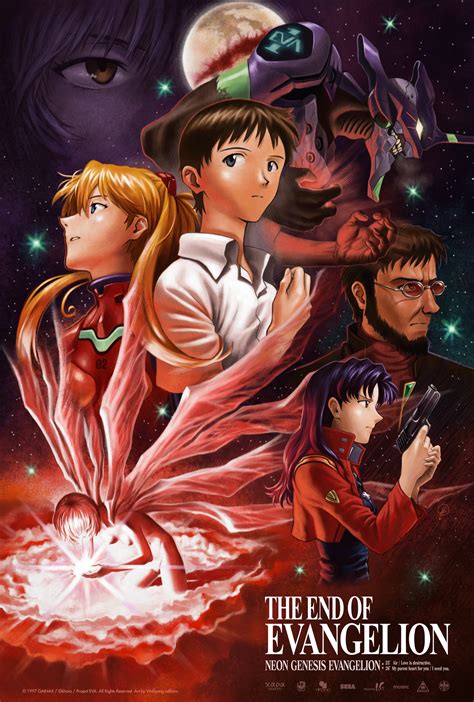Neon Genesis Evangelion: The End of Evangelion

Description:
Neon Genesis Evangelion: The End of Evangelion is a 1997 Japanese animated science fiction film directed by Hideaki Anno. The movie serves as an alternative ending to the Neon Genesis Evangelion TV series, offering a more conclusive and visually stunning conclusion to the complex and thought-provoking narrative.Keywords:
Existentialism, Apocalypse, Psychological, Identity, TraumaIs End of Evangelion a film?
Yes, "Neon Genesis Evangelion: The End of Evangelion" is a film. Released in 1997, it serves as an alternative ending to the popular anime series "Neon Genesis Evangelion." Directed by Hideaki Anno, the film combines elements of psychological drama, action, and philosophy, exploring complex themes such as identity, consciousness, and human relationships. It is known for its surreal visuals and deep narrative, making it a significant work in the anime genre and a subject of analysis among fans and critics alike.
Why did Evangelion get so dark?
"Neon Genesis Evangelion: The End of Evangelion" became notably darker as it delves into complex themes of existentialism, depression, and the human psyche. The film serves as a conclusion to the series, exploring the characters' inner struggles and traumas against the backdrop of apocalyptic events. It challenges traditional mecha anime tropes, opting for a more psychological and philosophical narrative. The darkness reflects the creator Hideaki Anno's intentions to confront the emotional and mental challenges faced by individuals, making it a profound and introspective experience.
What's the difference between Neon Genesis Evangelion and The End of Evangelion?
"Neon Genesis Evangelion" is a television series that aired from 1995 to 1996, exploring complex themes such as existentialism, identity, and human relationships through the story of teenagers piloting giant mechs to fight mysterious beings called Angels.
"The End of Evangelion," released in 1997, serves as an alternate ending to the series, presenting a more graphic and psychologically intense conclusion. It reinterprets key themes and provides closure to the narrative, addressing fan criticisms of the original finale and delving deeper into the characters' psyches.
Is Asuka alive at The End of Evangelion?
In "Neon Genesis Evangelion: The End of Evangelion," Asuka's fate is ambiguous. In one of the film's climactic scenes, she is seen in a post-apocalyptic world where she is initially alive, but her mental state is deeply affected by the events that have transpired. The film presents a surreal and complex narrative, leading to interpretations about her survival and the nature of reality. Ultimately, her status can be seen as a reflection of the psychological struggles faced by the characters rather than a clear-cut answer about being alive or dead.
Explore More Categories:
Interplanetary Working Class Holiday Musical Popularity Brotherhood Supernatural Horror Disease Prevention Modern Dating Torture Documentary Style Pressure Serial Killer Coming Of Age Media Survival Horror Concert Loneliness Alternate Reality Wealth Mustangs Diplomatic Immunity Postmodern Power Struggle Determination